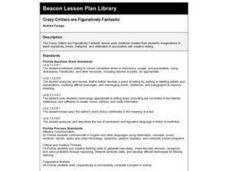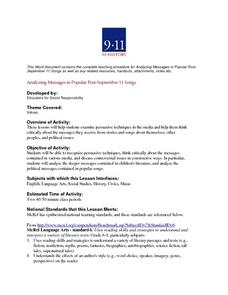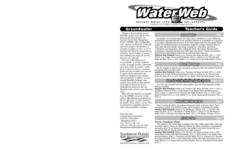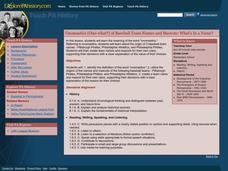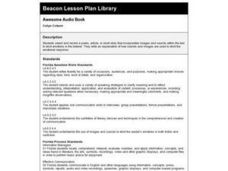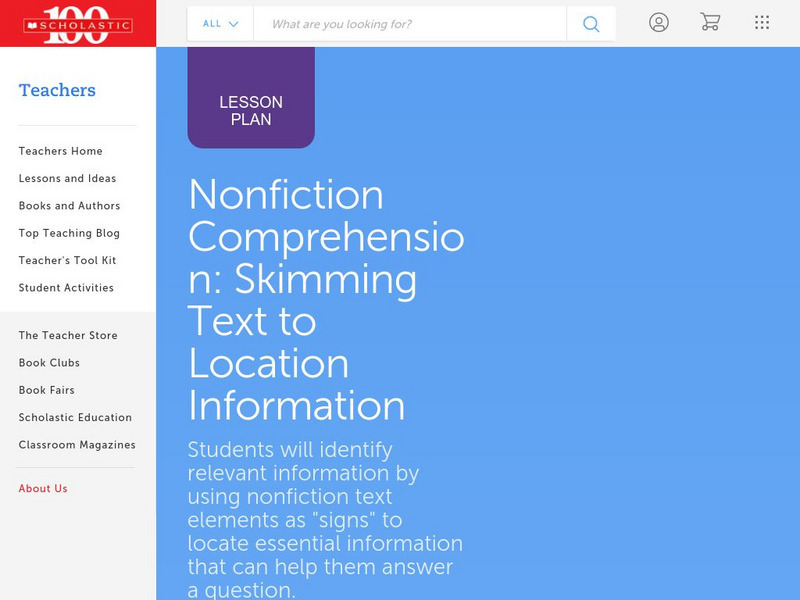Curated OER
Crazy Critters are Figuratively Fantastic
Eighth graders use creatures created from their imaginations to practice hyperbole, simile, metaphor, and alliteration in association with creative writing. They utilize a worksheet imbedded in this plan to guide their writing.
Curated OER
911 As History
Students recognize persuasive techniques, think criticaly about the messages contained in various media, and discuss controversial issues in constructive ways. They analyze the deeper messages contained in children's literature, and...
Curated OER
WaterWeb 2
In this water worksheet, students answer 10 questions about Florida's water. Students also describe the role of ground water and sinkholes.
Curated OER
What's In a Name?
Students explore onomastics. In this baseball history lesson plan, students create their own team name and explain the name they chose. After choosing a team name students support their choice with revelant reasons and be able to discuss...
Curated OER
Celebrations
Second graders answer questions after listening to the the story "Celebrating Life Around the World" and verbally identify three ways in which people celebrate special occasions. They then make two verbal connections from their own...
Curated OER
Making a Karst Dictionary
Students practice using the correct vocabulary in geology and hydrology. They use the Internet to research topics and practice their researching skills.
Curated OER
Rare, Fat, Flabby, Big-Mouthed Sharks
Learners research Megamouth Sharks and write paragraphs based on their findings.
Curated OER
Awesome Audio Book
Students choose a written piece and present it aloud in a student-made recording. They analyze how sounds are used to elicit emotion.
Curated OER
The Mysteries of Saturn and Cassini
Students examine photographs of Saturn and make observations. They develop questions they have based on viewing the photos. They work together to answer their questions.
British Library
British Library: 19th Century Non Fiction Texts: Work & Welfare
This thematic collection will allow students to read and understand 19th-century non-fiction texts, and support them in identifying key features for a range of genres, audiences, and purposes. Each source is accompanied by original...
British Library
British Library: 19th Century Non Fiction Texts: Gender, Behaviour & Etiquette
This thematic collection will allow learners to read and understand 19th-century non-fiction texts, and support them in identifying key features for a range of genres, audiences, and purposes. Each source is accompanied by original...
British Library
British Library: 19th Century Non Fiction Texts: Education
This thematic collection will allow students to read and understand 19th-century non-fiction texts, and support them in identifying key features for a range of genres, audiences, and purposes. Each source is accompanied by original...
British Library
British Library: 19th Century Non Fiction Texts: Crime & Punishment
This thematic collection will allow students to read and understand 19th-century non-fiction texts, and support them in identifying key features for a range of genres, audiences, and purposes. Each source is accompanied by original...
ReadWriteThink
Read Write Think: Using Science Texts to Teach the Organization of Nonfiction
Contains plans for three lessons that use science textbooks to teach about the organizational features of nonfiction such as labels, captions, headings, and fonts. In addition to objectives and standards, this instructional plan contains...
ReadWriteThink
Read Write Think: Comprehending Nonfiction Text on the Web
Contains plans for three lessons designed to improve comprehension of nonfiction, especially nonfiction texts on the web. It focuses on identifying text features, locating specific information, and generalizing that information. In...
Reading Rockets
Reading Rockets: Nonfiction
Provides advice for how to incorporate nonfiction into a reading program. Includes videos, links to downloadable 'adventure packs,' tip sheets for parent, a list of websites on nonfiction, and articles.
Scholastic
Scholastic: Investigating Nonfiction Part 3: Independent and Guided Reading
This article provides tips for using nonfiction with guided reading and independent reading. The following strategies are shared: ways to help kids select "just right" nonfiction books; lessons to use with nonfiction in guided reading...
Scholastic
Scholastic: Lesson Plan for Nonfiction Comprehension: Skimming Text
Build comprehension by developing reading strategies for use with nonfiction text. This lesson focuses on teaching students to recognize text elements as clues to help them quickly locate key information in text.
Colorado State University
Colorado State Writing Center: Critical Reading
In-depth instructions on critical reading with lots of links to more reading guides and activities. A good site to help improve reading skills to become a better writer.
Read Works
Read Works: Lessons: Click, Clack, Moo: Cows That Type
[Free Registration/Login Required] A lesson plan and materials to teach kindergarten students how to tell the difference between fiction and nonfiction.
Utah Education Network
Uen: Using a Before Reading Organizer With Informational Text
This module provides strategies to use with informational text. Teachers will explicitly teach students about graphic organizers to use before reading informtational texts.
Other
Seeing the World in Print Through Nonfiction
Unit plan containing five lessons designed for tenth graders. They center around reading and writing nonfiction, and they teach skills such as identifying the features of nonfiction and writing expository texts. All are aligned to...
Reading Rockets
Reading Rockets: Content Area Literacy
Content area lessons require specific techniques and knowledge that help students navigate different types of texts. Here you will find articles, videos, teaching strategies, webcasts, and research reports.
TES Global
Tes: Guided Reading Resources: Nonfiction
[Free Registration/Login Required] This learning module contains several guided reading resources. Students will be able to use the charts to guide themselves as they discuss informational texts and persuasive texts. Teachers can monitor...


